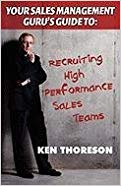Many times during the planning stages of the implementation of a CRM system we have found that clients struggle as they have not defined their detailed sales process. For example, knowing when to change or move the “stage” of the sale forward becomes critical; do you move the stage forward when you “book” the next event or “after” the event as occurred? Whether you have an existing CRM system or not, the purpose of defining a specific sales process is to improve your odds in winning more opportunities and proving your value proposition to your prospects. The key is for sale management to make sure their sales teams execute the sales process properly.
The more prescriptive process you create, the greater success your sales team will experience. Salespeople tend to lose opportunities when they execute poorly, this is due to lack of training but it is also because they missed something during the sales process. They missed it because they simply forgot to execute at some point or they didn’t have a pathway to follow. Remember, A level salespeople probably don’t need this kind of sales mapping, but you can move a C level salesperson to a B level by providing tools, guidance and process to follow.
I always use the example of Subway sandwiches and how their counter people are trained to simply walk down the counter by asking your certain questions as you sandwich is built. If your sales teams execute that well you get the production Subway does!
How you define a sales process is important. Just yesterday I was speaking with a small business who mentioned they had a good sales process defined, in going deeper in our conversation I learned they had no tools, nothing documented and nothing reinforced. Recently in working with an Acumen client we spent about two hours simply documenting what a salesperson should do on each of the various steps of their sales process, it enlightened the existing sales manager and created the beginning of a new sales driven culture for the company. What happened?
- In forcing the process of “thinking through’ the logical progression and the actual actions the salesperson should take, we altered the second step and changed “what “the salesperson was to say and sell during that stage.
- We created one additional professional service product that could be re-sold.
- The Sales Manager began to fully understand not only what the steps in the sales process were, but more importantly WHY the salesperson needs to execute on them.
- Actual definitions of each action within each stage were specifically defined. Why is this important? Pipeline values become more accurate. Let me describe this in more detail. Let’s assume there is a “demonstration” stage in your sales cycle, next ask yourself, when do your salespeople move the prospect to the demo stage: When it is scheduled? Or after it is completed? This is an example of the kinds of detail that will come out during the process.
This is an example of a Discovery Stage:
Discovery (Opportunity) Stage 3
#3: Discovery Meeting(s) (KEY STEP – this is how we differentiate ourselves.)
Salesperson Responsibility:
- Lead the Discovery Questioning with a Focus on landscape of the opportunity & Document Current Process
- Identify Critical Business Issues
- Identify Roles of prospects Team
- Goals for Future Business Solution
- Identify people attending the demo
- Establish Success Factors
- Take Good Notes , attached to CRM
#4: Summarized Findings Document
- Create Findings Document in CRM
- Review Findings Document for Final Version
- Contribute Notes to Findings Document
- Submit Findings to prospect along with appropriate Case Study
- Modify sales Pathway and discuss with Prospect
- Determine if Tech/Support Team support is required
- Coordinate Additional XXX company resources, if required
- Send Letter from President
- Update CRM
#5: During the sales process your companies Value Proposition must be proven. You can build a step or an action that takes place at the appropriate stage that can validate your messaging. We created what we expect to be a unique idea for the client to prove theirs.
#6: One of the most important aspects of creating a prescriptive sales process is changing the sales process! What I mean is; if you and your competitors use the basic sales stages in the same sequence and say and do the same things no one stands out and prospect becomes confused. When there is confusion, generally there is no decision. Change your sales process to stand out, be different and make the customer remember you. Refer to my previous blog on the End of Solution Sales.
#7: We added a last step: a follow up at 90 days post implementation/installation to validate customer satisfaction and ask for a reference letter.
The next step is for the sales manager to roll you the process, teach the salespeople how to execute and then “inspect what you expect” that the sales team is using the process as it is defined.
HINT: As a Sales Manager, work through what you think the sales process should look like, then hold a sales meeting to “brain storm” with your salespeople as to what they think the prescriptive process should contain. This will help build a buy-in by the sales team.
Set a 90 day plan in place to implement and evaluate the results; create four or five metrics to measure its effectiveness, validate it is being used and to listen to your team. If it needs to be altered to increase effectiveness that is ok, but before you change-make sure you are fully understand the impacts.
Let me know your thoughts on creating a sales process. What has worked for you? What hasn’t?












